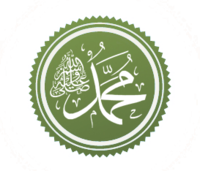This article is about the Islamic prophet. For other persons named Muhammad, see Muhammad (name). For other uses, see Muhammad (disambiguation).
| Muhammad Muḥammad - (محمد) |
|---|
 |
Abū al-Qāsim Muḥammad ibn ʿAbd Allāh ibn ʿAbd al-Muṭṭalib ibn Hāshim (Arabic: محمد بن عبد الله بن عبد المطلب ) (c. 570 – c. 8 June 632),[1] alsotransliterated as Muhammad (Arabic: محمد), was a religious, political, and military leader[2][3][4] from Mecca who unified Arabia into a single religiouspolity under Islam. He is believed by Muslims and Bahá'ís to be a messenger and prophet of God and, by most Muslims, the last prophet sent by God for mankind.[5][n 1] Non-Muslims regard Muhammad as the founder of Islam.[6] Muslims consider him to be the restorer of an unaltered originalmonotheistic faith of Adam, Noah, Abraham, Moses, Jesus, and other prophets.[7][8][9][10]
Born in about 570 CE in the Arabian city of Mecca,[11][12] he was orphaned at an early age and brought up under the care of his uncle Abu Talib. He later worked mostly as a merchant, as well as a shepherd, and was first married by age 25.[13] Being in the habit of periodically retreating to a cave in the surrounding mountains for several nights of seclusion and prayer, he later reported that it was there, at age 40,[11][14] that he received his first revelation from God. Three years after this event Muhammad started preaching these revelations publicly, proclaiming that "God is One", that complete "surrender" to Him (lit. islām) is the only way (dīn)[n 2] acceptable to God, and that he himself was a prophet and messenger of God, in the same vein as other Islamic prophets.[15][16][17]
Muhammad gained few followers early on, and was met with hostility from some Meccan tribes; he and his followers were treated harshly. To escape persecution, Muhammad sent some of his followers to Abyssinia before he and his followers in Mecca migrated to Medina (then known as Yathrib) in the year 622. This event, the Hijra, marks the beginning of the Islamic calendar, which is also known as the Hijri Calendar. In Medina, Muhammad united the tribes under the Constitution of Medina. After eight years of fighting with the Meccan tribes, his followers, who by then had grown to 10,000, took control of Mecca in the largely peaceful Conquest of Mecca. He destroyed the pagan idols in the city[18] and then sent his followers out to destroy all of the remaining pagan temples in Eastern Arabia.[19][20] In 632, a few months after returning to Medina from The Farewell Pilgrimage, Muhammad fell ill and died. By the time of his death, most of the Arabian Peninsula had converted to Islam, and he had united Arabia into a singleMuslim religious polity.[21][22]
The revelations (or Ayah, lit. "Signs [of God]") — which Muhammad reported receiving until his death — form the verses of the Quran, regarded by Muslims as the “Word of God” and around which the religion is based. Besides the Quran, Muhammad’s life (sira) and traditions (sunnah) are also upheld by Muslims as the sources of sharia law. They discuss Muhammad and other prophets of Islam with reverence, adding the phrase peace be upon him whenever their names are mentioned.[23] While conceptions of Muhammad in medieval Christendom and premodern times were largely negative, appraisals in modern history have been far less so.[17][24]

No comments:
Post a Comment